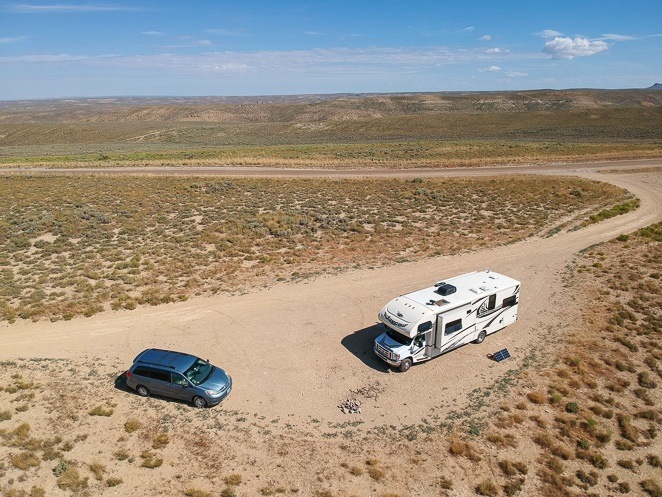
Boondocking, also known as dry camping, is RVing without hookups for water, electric and sewerage. It’s camping “off the grid,” away from crowds and amenities typically found in RV parks, campgrounds and resorts. Perhaps best of all, boondocking is free, with no reservations required.
For those RVers who are new to boondocking, the whole idea can seem a little overwhelming. For one, you have to come prepared, ready to use freshwater tanks, a generator, propane and more. But the bigger question is where you can do boondocking in an RV without getting in trouble. Thankfully, everything you need to know and more is right here, so before hitting the highway, check out these six boondocking tips.
Boondocking on BLM land
BLM land is territory managed by the Bureau of Land Management and often has primitive campgrounds, which include a fire pit, picnic table and vault toilet. While there are no amenities like coin-up showers or information centers, these sites offer free camping for up to 14 days (and no reservations are required).
Campgrounds on BLM land can be tough to find because they are notoriously poorly marked. However, an online search using a site such as freecampsites.net will yield maps and precise coordinates to locate campgrounds. Many are in naturally beautiful areas that offer serenity and connection to the outdoors that cannot be beaten.
BLM territory is public land, meaning it’s available to everyone. While your stay will often be very private, you might have some company in the form of cows. Ranchers frequently bring their hungry herds to BLM land to graze, so it’s not unusual to wake up to the sounds and sights of a farm.
Boondocking at Walmarts
Many Walmarts across the country will allow RVers to park overnight. Not only is this option free, but Walmarts also mean easy access to supplies and needed items. While many guides exist online to determine which Walmarts allow “wallydocking,” it’s always a good idea to give the store a call. Most store managers will provide a straightforward yes or no and are usually pretty nice about it.
Notably, you won’t be able to use a generator here and Walmart-boondocking-etiquette means keeping a low profile. Safety is another important caveat when staying in any place that’s not an official camping spot. Know the neighborhood and area you’re going into and avoid poorly lit spaces.
Boondocking in National Forests
The best-kept secret of national forests is that you can camp in any of them for free. Like BLM lands, national forests often have primitive campgrounds that are free to use for up to 14 days, and because they often surround National parks, they make great campsites while you explore popular attractions during the day.
The roads in national forests are logging roads made of dirt and gravel, and can sometimes be a little rough. Online reviews from past RVers are key to understanding road conditions before you go and whether your rig will have the ground clearance to make the journey.
Boondocking at casinos
Although not really family-friendly, many casinos around the country are happy to let potential gamblers stay overnight in their parking lots. These spaces are also usually well-lit and secure, and you will be surrounded by other RVers as well, upping the safety factor. Even still, it’s always a good idea to call a casino ahead of time to see if they’ll let you stay.
Boondocking at highway rest stops
Rest stops can be a great option for overnight stays, especially if it’s getting late and you’re in a pinch. Some have restaurants and convenience stores; all have bathrooms.
Despite their convenience and low cost, rest stops can also be noisy places to stay. Expect to hear the highway and truckers coming and going throughout the night.
Boondocking in a friend or family member’s driveway
It can be easy to overlook the simple solutions on long trips with detailed itineraries. But one travel tip to always remember are the friends and family along your route. Staying in a loved one’s driveway is a budget-friendly option and an opportunity to reconnect with someone near and dear to your heart.
Some closing thoughts.
In an RV, you’re always close to home. Boondocking helps you take advantage of that and can help you save hundreds of dollars. But perhaps more importantly, boondocking has soared in popularity because it’s a more peaceful way to camp in beautiful locations for days or even weeks. Whatever your motivation, know you can do both with relative ease, as long as you’re prepared.
Ready to go RVing with your big family? Check out our RV page.
